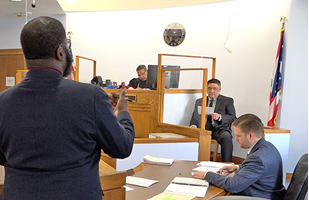Rural Attorney Program Repays Student Loans

Soon-to-be and young lawyers can save on their student loans while helping underserved communities through the Rural Attorney Incentive Program.

Soon-to-be and young lawyers can save on their student loans while helping underserved communities through the Rural Attorney Incentive Program.
Court administrator Kim Seitz is a one-person administrative office for Vinton County Court of Common Pleas. She spends much of her time coordinating the court’s docket with a limited number of attorneys who can take on criminal and family law cases.
“We have only five or six attorneys we can appoint to cases, and only one of them lives in the county,” said Seitz. “We cluster as many cases as we can for those attorneys, so they don’t have to travel back and forth as much.”
A shortage of attorneys to meet the legal needs of the people she serves isn’t exclusive to the state’s least-populated county. It’s a statewide concern. People living in these communities are far less likely to have access to lawyers as they navigate complex legal issues related to health care, housing, food assistance, criminal defense, juvenile cases, abuse, and delinquency.
“Today, nearly 75% of Ohio lawyers practice in the state’s six largest counties, leaving 56% of Ohioans with too few attorneys to meet their legal needs,” said Supreme Court of Ohio Chief Justice Sharon L. Kennedy.
The chief justice is partnering with organizations throughout the state to help bridge that gap in access to justice. The Rural Practice Incentive Program is a state-funded loan repayment initiative that’s focused on connecting newer lawyers with communities that have too few lawyers. The program is administered by the Ohio Department of Higher Education (ODHE).
“It’s a win-win not only for those newly licensed attorneys who have loans to repay, but also those communities where their expertise is most needed,” said ODHE Chancellor Mike Duffey.
Attorneys can serve as prosecutors or public defenders, ensuring that a person charged with a crime is fairly treated throughout the judicial process as required by the U.S. and Ohio Constitutions. Lawyers can also serve as a court-appointed attorney. Those attorneys can represent people who can’t afford a lawyer or a child in a legal matter, such as a parental rights dispute or a case involving abuse or neglect.
“Being in court can be incredibly stressful for people because there are so many things they don’t understand. That’s why it’s so important for us to have these appointable attorneys to explain to their clients about the process and put them at ease,” said Seitz.
Lawyers who commit to a minimum of three years and up to five years in an underserved community can receive up to $10,000 per year toward student loan repayment. An underserved community is one where there is one attorney or fewer per 700 residents. Eligible lawyers must be licensed for less than eight years and cannot be participating in another state or federally funded student loan repayment or debt forgiveness program.
People who want to apply can do so through the ODHE website. Applications are due by March 15.
“Every Ohioan should have access to justice. Working together, we will close the gap in legal services in Ohio,” said Chief Justice Kennedy.


